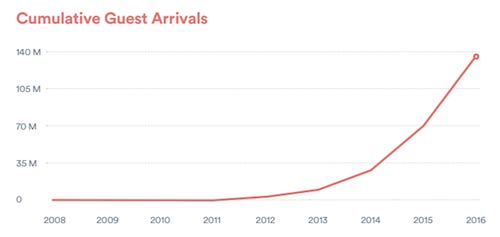Mutual funds sell unicorn shares, Airbnb adds policy “tool chest,” and the longest Uber ride
XXXVIII
The eye of Uber.
This story on Uber’s user privacy from the Center for Investigative Reporting was making the rounds yesterday, largely for the shocking claim at the very top: “Internal Uber employees helped ex-boyfriends stalk their ex-girlfriends and searched for the trip information of celebrities such as Beyoncé.” That is from Ward Spangenberg, Uber’s former forensic investigator, who is suing Uber for age discrimination and has alleged serious abuses of user data in a court declaration. The accusations dredge up bad memories for Uber, which drew outrage in late 2014 when one of its executives suggested digging up dirt on journalists at a private dinner, and another used a “God View” mode to track a reporter’s location without her permission. Uber paid $20,000 to settle a probe into God View by the New York attorney general earlier this year.
The damning claim in the CIR story (not to mention the Orwellian gif illustrating it, above) is that after that entire scandal in 2014 Uber still didn’t reform. “Five former Uber security professionals” told CIR that “the company continued to allow broad access” to users’ trip information even after claiming to limit it. “When I was at the company, you could stalk an ex or look up anyone’s ride with the flimsiest of justifications,” says Michael Sierchio, a senior security engineer at Uber from early 2015 to June 2016. Uber for its part says it is “absolutely untrue that ‘all’ or ‘nearly all’ employees have access to customer data, with or without approval.” It also emphasizes that certain employees—like those in anti-fraud—have “legitimate reasons to access customer data.” In an email to Uber employees yesterday, John “Four” Flynn, the company’s chief information security officer, wrote that “much of the information” in the CIR story “is out of date and doesn’t accurately reflect the state of our practices today.”
Even so, the optics for Uber aren’t great, which was already on thin ice with privacy-conscious users after its latest app update asked iOS users to grant continuous location tracking (versus access to location data “while using the app”). Uber said it would only collect this information from users “from when a rider requests a trip until five minutes after the trip has finished” to improve its ETAs, pickups, and other routing features. But privacy advocates contended that the company could accomplish much of the same with the more limited “while using the app” option for location tracking. “They’re designing a system that is ripe for abuse,” says Nate Cardozo, senior staff attorney at the Electronic Frontier Foundation. “They’ve removed the technical controls that could prevent abuse along the lines that are described in [the CIR] story.”
Unicorn accounting.
Here is an interesting article from the Wall Street Journal, Wall Street Cop Asks Money Managers to Reveal Silicon Valley Valuations. Regulators are worried about how mutual funds are valuing some of the biggest private tech companies—aka unicorns like Uber, Airbnb, and Pinterest—in their portfolios. They are “particularly concerned about the lack of uniform valuation methods across fund companies and that using public companies as benchmarks doesn’t actually portray what a fledgling company is worth, according to people familiar with the regulators’ thinking.” This isn’t the first time that these worries have bubbled up; in February, the New York Times reported that investors in a special Morgan Stanley fund with exposure to Uber, New Riders L.P., were “effectively handing over their money with their eyes closed.” Meanwhile, The Information reported Monday (Dec. 12) that mutual funds have recently sold shares in high-profile tech startups, although it’s rare to do that before a company sells or goes public.
Democratizing everything.
Airbnb’s reconciliation continues, this week with the Airbnb policy tool chest. The tool chest as far as I can tell is a more detailed version of the community compact, a document Airbnb released last year outlining how it would improve relationships with cities, and the tools themselves are vague policy statements, like “tax collection” and “good neighbors.” There is also the introduction to the policy tool chest, which in four short paragraphs gets in three uses of “Airbnb is democratizing” (capitalism, tourism, revenue), one use of “economic empowerment,” and, in the very first sentence, both “people-to-people platform” and “of the people, by the people, and for the people.” I don’t know, I’m really not sure what message Airbnb is going for here, perhaps they could hammer it home a little more.
Airbnb, you’ll recall, has redoubled its efforts to make nice with governments after the regulatory threat to its core business of peer-to-peer rentals intensified this year. Over the last few weeks the company has been on something of an apology tour, cutting deals to tighten home-sharing regulations in cities where it previously resisted. On Tuesday (today) Airbnb policy chief Chris Lehane was in Australia, home to one of the company’s top five cities globally, telling journalists, “there may be pieces of [legislation] we don’t like and pieces that we love, but generally it ends up being a pretty productive, constructive process.” That had better be true if Airbnb wants to maintain this nice upward sloping chart.
Elsewhere: Brian Chesky’s Big Gamble (paywalled).
The longest Uber ride.
Virginia to Brooklyn, eight hours and nearly 400 miles. Driven by Janis Rogers, age 64, who promptly turned around and went home after dropping off her passenger in Bed-Stuy. Bill for passenger: $294.09. Earnings for Rogers: not great.
Rogers, who didn’t even own a cellphone before joining Uber in May, didn’t make much money on the longest ride.
After driving 15½ hours round-trip and spending $32 for gas and tolls (she didn’t spend a dime on food or drinks), the trip earned her about $9 per hour, she calculated.
“This was not lucrative,” she said. “I did it because it was an adventure.”
Other stuff.
T.J. Miller arrested for hitting his Uber driver. Airbnb plunges in Glassdoor rankings. Grab adds carpool. Ola pre-sells subscriptions. Googled Scaled Back Self-Driving Car Ambitions. Truckers Think Automation Won’t Take Their Jobs for 40 Years. Uber drivers balk at fines in Taiwan. Uber bans flirting. Amazon warehouse workers are sleeping in tents. Rocket Internet sells Foodpanda. Equidate settles on pre-IPO swaps. Didi’s IPO hurdles. Lyft’s economic impact. Uber but for Star Wars. Uber but for ugly holiday sweaters. Unicorn identity crises. VC hot dogs. Startup layoffs. The Latest Unicorn Is a Jay Z-Backed Startup That Wants to Make Private Jets Much Less Private.





